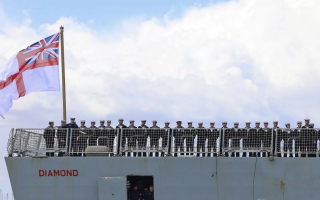Tri-Service
Analysis: Labour's Ticking Nuclear Time Bomb
Article by James Hirst, Political Editor
Jeremy Corbyn has just seen off a challenge from disgruntled MP's and been re-elected as Labour Leader, with an even bigger mandate.
So why have two of his close allies effectively admitted defeat (for now) over party policy on nuclear weapons?
This is an issue that defined Mr Corbyn for his many years on the back benches, his anti-war campaigns and his support for unilateral disarmament; Britain abandoning its nuclear weapons to make the world a safer place.
Jeremy Corbyn's Labour still has an official policy to back the replacement of the Trident nuclear deterrent.
The Shadow Defence Secretary, Clive Lewis, told the conference “I am sceptical about Trident renewal, as are many here. But I am clear that our Party has a policy for Trident renewal. But I also want to be clear that our Party’s policy is also that we all share the ambition of a nuclear-free world. So we will take steps to make that ambition a reality.”
According to the Shadow Foreign Secretary that will mean Britain leading efforts for global talks on multilateral disarmament, something she said would be the test of Labour's success on foreign policy. It's an ambitious goal.
What these two Labour front benchers said today doesn't rule out a change in Labour policy on Trident, but it sends a clear signal that it is not a battle they want to have in the party at the moment.
It was no surprise that the General Secretary of CND, Kate Hudson, said she was 'shocked' and 'disappointed'. “We were expecting to have proper debate and discussion in the Labour Party” she told me.
No surprise either that one of Tony Blair's former Foreign Ministers, Ben Bradshaw, was all smiles at the news. “The vast majority of the public and most Labour voters think we should keep our nuclear weapons and negotiate them away, not just give them up” he said.
It has certainly offered reassurance to Corbyn-sceptics, as has the commitment from the Shadow Defence Secretary to NATO's collective defence, and the 2% spending pledge.
That felt like a direct intervention after Jeremy Corbyn repeatedly refused to commit that he would guarantee military support to a NATO ally in need, during a leadership debate.
So has Jeremy Corbyn accepted he's at odds with much of his party on these kind of issues?
Only he knows the answer to that, but if conference gossip is to be believed his top-spin doctor changed some parts of Clive Lewis's speech at the last minute to leave the leader's options more open.
What has been said has not healed the divisions in Labour on defence, it has merely attempted to put a very big plaster over the wound to deal with it later.









